How ADHD Can Affect Insomnia
ADHD (attention-deficit/hyperactivity disorder) is one of the most common neurodevelopmental disorders present in children. While most cases are diagnosed in childhood, the side effects of ADHD often linger well into adulthood.
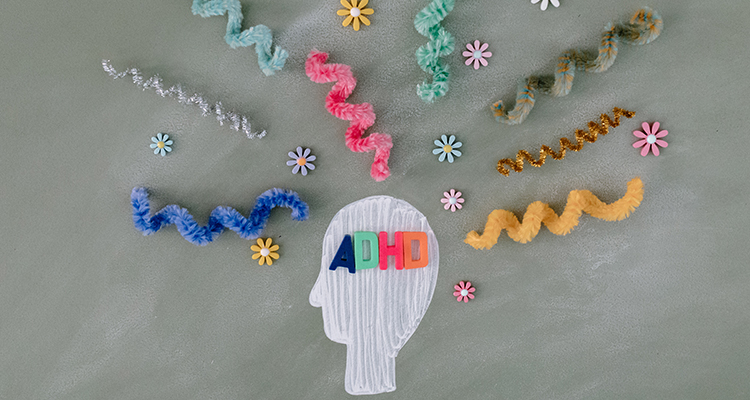
The most common symptoms of this disorder are the inability to pay attention or focus, lack of control over impulsive behaviors, and excess energy. ADHD makes it difficult for children and adults to give daily tasks the attention they need. Individuals with ADHD are often referred to as “fidgety”.
This lack of self-control and inability to sit still makes it difficult not only to pay attention but also to sleep.
Here we’ll take a closer look at the specific symptoms and causes of ADHD and how they can impact sleep patterns, leading to insomnia.
Content
What is ADHD?
Let’s start by discussing exactly what ADHD is. Attention-deficit/hyperactivity disorder is a mental disorder that mostly affects children but is present in adults as well. According to the American Psychiatric Association, 8.4% of children have ADHD, while only 2.5% of adults struggle with this condition.
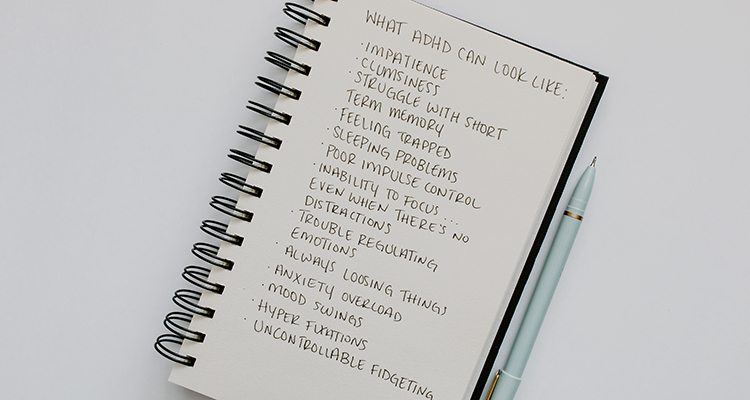
As the name suggests, ADHD is marked by inattention (the inability to focus on tasks for long periods of time), hyperactivity (excessive movement that’s not appropriate in the current setting), and impulsivity (acting hastily at the moment without thought). ADHD is usually recognized as a child enters grade school since their hyperactive tendencies don’t bode well in the classroom setting.
ADHD interferes with an adult’s daily life in different ways, with one major impact being chronic sleep deprivation. Daytime fatigue can lead to falling asleep at inappropriate times, causing problems and judgment in the workplace. Sudden bouts of sleepiness can also make driving dangerous.
Daytime fatigue caused by ADHD and sleep deprivation also impacts your mood. Many sufferers experience mood swings, irritability, and restlessness throughout the day. This can negatively impact both professional and personal relationships. Some individuals with ADHD aren’t comfortable sharing their condition, making it difficult for others to understand and accept their behavior. These strained relationships can cause even more distress and anxiety, impacting sleep patterns even further.
Diagnosing ADHD
Diagnosing ADHD isn’t always easy since many of the side effects and symptoms are common among most children. For example, a short attention span and the inability to sit still. The difference between someone with ADHD and someone who lacks focus is that these tendencies interfere with their ability to function in everyday life. For kids, this includes disrupting the classroom, whereas adults find trouble completing assignments at work and staying on task.

There are 3 main types of ADHD: inattentive, hyperactive/impulsive, or combined. A diagnosis is made based on symptoms observed over a six-month period. Individuals must also exhibit a certain number of symptoms based on their age.
Inattentive
For inattentive ADHD, children under the age of 17 must exhibit six of the following symptoms while anyone over the age of 17 must show frequent signs of five of these symptoms.
- Makes careless mistakes at work and school
- Lacks focus during meetings, lectures, or in-depth conversations
- Seems distracted when spoken to
- Fails to follow through with work or follow directions
- Struggles to organize tasks or exhibit time management skills
- Avoids tasks that require sustained mental effort
- Forgetful (loses items or forgets to complete required tasks)
Individuals with inattentive ADHD often go to bed later and may find it more difficult to wake in the morning. They struggle to maintain a healthy sleep schedule, which has adverse side effects on their ability to function during the day.
Hyperactive/Impulsive
The same standard of exhibiting six tendencies for children under the age of 17 and five for those over 17 is needed for a diagnosis of hyperactive/impulsive ADHD.
- Taps hands or feet, fidgets, or squirms in place
- Inability to stay seated at work or in the classroom
- Unable to engage in leisurely activities quietly
- Always “on the go”
- Excessive talking
- Finishes people’s sentences, talks over them, or interrupts
- Inpatient (difficulty waiting in lines or for activities to begin)
Individuals suffering from hyperactive/impulsive ADHD are at higher risk of developing insomnia due to their inability to settle down at night. This can lead to restless sleep, waking frequently, and daytime fatigue.
Combined ADHD is present when someone exhibits both inattentive and hyperactive/impulsive symptoms. Individuals who receive this diagnosis often exhibit symptoms of both insomnia and poor sleep quality. They often have a later bedtime, take longer to fall asleep, and wake several times throughout the night.
It’s important to note that there are no approved lab tests used to diagnose ADHD. A diagnosis is based strictly on behavioral observations and the impact the above side effects have on the person’s life.
ADHD Symptoms and Sleep Deprivation
Research shows that many ADHD symptoms are similar to those linked with sleep deprivation. Adults with ADHD-related sleep issues often experience forgetfulness and difficulty focusing. Children with hyperactive/impulsive ADHD may also experience daytime fatigue.
Because these symptoms are so closely correlated, it can be difficult to determine if they’re related to insomnia, ADHD, or both. This can lead to a misdiagnosis and prolonged sleep trouble. In some cases, patients are screened first for a sleep disorder and then for ADHD if no determination is made.
Who’s At Risk for Developing ADHD?
There’s no known cause of ADHD, which makes determining risk factors difficult. While research is ongoing, some evidence suggests that genetics play a role. One study reported that 3 out of 4 children with ADHD also have a relative with the disorder.

Some factors at birth may also put children at greater risk of developing ADHD including premature birth, a mother who smokes or uses alcohol, brain injury, or extreme stress during pregnancy.
While ADHD is most often diagnosed at a young age, many adults with ADHD never received a proper diagnosis as a child. Adults who notice persistent symptoms may seek an evaluation from a medical professional. At this point, the doctor will perform a medical exam, evaluate the patient’s current and past symptoms, and use an adult rating scale to diagnose the condition.
Adults suffering from ADHD receive similar treatment as children including a combination of medication and psychotherapy. Some individuals need behavior management strategies that help improve focus and organization.
A medical professional will likely ask the patient if they’re also having trouble sleeping. If so, they may opt for a sleep study or other tests to diagnose a sleep disorder before prescribing ADHD medication.
Other symptoms that are shared by both ADHD and insomnia sufferers include:
- Depression
- Anxiety
- Higher than normal BMI
- Difficulty processing information
- Difficulty concentrating
Diagnosing ADHD often goes hand-in-hand with diagnosing chronic sleep disorders.
How ADHD Affects Sleep
Now that you have a better understanding of what ADHD is, symptoms, and risk factors, let’s take a closer look at exactly how this disorder impacts sleep and can cause insomnia in some people.
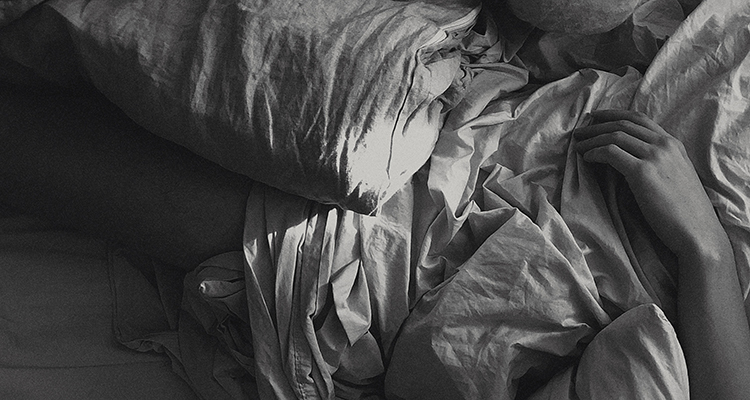
It’s no surprise that people with ADHD have a hard time falling asleep. Excess energy and the inability to sit still make it difficult for ADHD sufferers to settle down at night. Lack of sleep can actually aggravate ADHD symptoms making it even harder to fall asleep the next time. This creates a vicious cycle of insomnia and extreme ADHD symptoms.
Difficulty relaxing at night isn’t the only way ADHD can negatively affect your sleep patterns. Other factors put ADHD patients at greater risk of developing insomnia.
These include:
Medication
Many medications used to treat ADHD can actually cause sleep disturbances and long-term insomnia. The most common culprit is stimulants, which may help ease ADHD symptoms but leave you feeling alert and energized.
ADHD sufferers who also consume natural stimulants like caffeine, chocolate, and soda are at greater risk for sleep disturbances and insomnia.
Mental Illness
If you have ADHD accompanied by another mental health disorder like anxiety, depression, or mood swings, you’re more likely to develop insomnia. It’s fairly common for ADHD sufferers to experience these symptoms together. Substance abuse problems can also make it difficult for individuals to fall and stay asleep.
Inability to Keep a Schedule
We already mentioned that individuals with ADHD are easily distracted and have a difficult time completing assignments and ignoring distractions. Because of this, people with ADHD struggle to keep a healthy sleep schedule or going to bed at the same time each night.
Once in bed, you’re more likely to fidget, toss, turn, and experience racing thoughts. As the body and mind come to rest, you may “hyperfocus” on a certain idea or problem. This can also trigger stress, another common cause of insomnia.
Other Sleep Disturbances Caused by ADHD
While an ADHD diagnosis alone can trigger insomnia, it can also cause other conditions that compromise your sleep and may cause long-term complications.
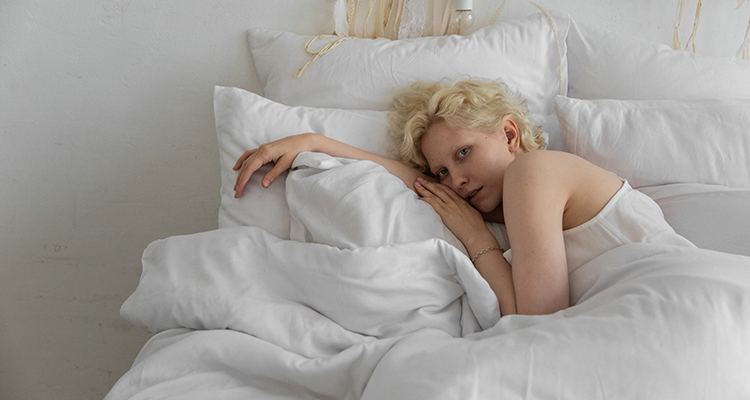
Sleep Apnea
Individuals with sleep apnea stop breathing throughout the night. While a number of factors can cause this condition including alcohol use, obesity, and diabetes, ADHD may also be to blame. On average, 25% of people with ADHD also have sleep apnea or another sleep-disordered breathing issue.
Signs of sleep apnea include daytime fatigue, snoring, and dry mouth.
Circadian-Rhythm Sleep Disorders
Your circadian rhythm controls your body’s wake-sleep cycle. It triggers your body to prepare for sleep and helps you wake, alert and ready for the day come morning. When your circadian rhythm is “off”, you can’t maintain a healthy sleep routine.
Blue lights from your smartphone, TV, and tablet can also interfere with your sleep cycle. Many ADHD sufferers turn to these devices as a distraction or out of boredom when they can’t seem to fall asleep. Unfortunately, doing so is only worsening the condition.
Restless Leg Syndrome (RLS)
RLS affects about 10% of the population, causing discomfort in the legs and an overwhelming urge to move them. These feelings become worse at night, making it impossible to fall and stay asleep. Some sufferers describe this discomfort as an ache or throbbing, while others claim it feels more like an itch.
Research shows that 44% of people with RLS also have ADHD.
Treatment Options for Insomnia Caused by ADHD
The first step in treating insomnia caused by ADHD is to get an ADHD diagnosis. Once you do, you’ll have a better handle on the root cause of your sleep disturbances.

If you’re currently taking medication to treat ADHD and are experiencing trouble sleeping, check with your doctor. A change in medication might be in order. If this doesn’t work, your doctor may order a sleep study to confirm that another underlying condition isn’t causing your sleep trouble.
Once all of these avenues are exhausted, you should know whether or not your sleeplessness is caused by ADHD alone or another external factor. If ADHD is the culprit, there are a few things you can do to help create healthy sleep habits.
Avoid Napping
One of the most common and least talked about symptoms of ADHD is fatigue. Some people find this surprising since most ADHD symptoms involve excess energy, movement, and hyperactivity.
For those ADHD patients that suffer from fatigue during the day, naps can be tempting. Unfortunately, napping during the day can drastically impact your ability to get a good night’s sleep. Ditch the nap and opt for natural energy-boosting activities instead, like exercise and other stress-relieving activities.
Follow a Consistent Sleep Schedule and Routine
This can be difficult for ADHD sufferers, but creating a consistent sleep schedule keeps your circadian rhythm on track and makes it easier to fall asleep at night. Try going to bed around the same time every night and waking at the same time each morning — even on the weekends.
Bedtime routines are about more than just setting an alarm. Try to perform relaxing, sleep-inducing activities before bed each night. Reading, practicing mindfulness, yoga, and meditation are all common practices for relaxing the mind and body and inducing sleep.
Your bedroom should also be an oasis for sleep. Keep it dark with a comfortable mattress and pillows. Add warm lighting, a sound machine, or soothing music to help create a relaxing environment.
Avoid Certain Things Before Bed
Avoid ingesting any stimulants too close to bed time. These include certain medications, caffeine, or foods and drinks high in sugar. If you need to take your ADHD medication, try to do so at least 4 hours before bed.
Drinking alcohol before bed is another common cause of insomnia. Alcohol slows down brain activity, acting as a sedative. While this may seem like a good thing and make you feel tired and relaxed, once these effects wear off, you’ll find yourself restless, agitated, and unable to sleep.
Don’t Let Your ADHD Diagnosis Keep You Awake at Night
Do you suffer from ADHD? Is it negatively impacting your sleep? If so, you’re not alone! Countless ADHD sufferers also struggle to get a quality night’s sleep. With so many factors at play, it can be difficult to pinpoint the exact cause of your sleeplessness.
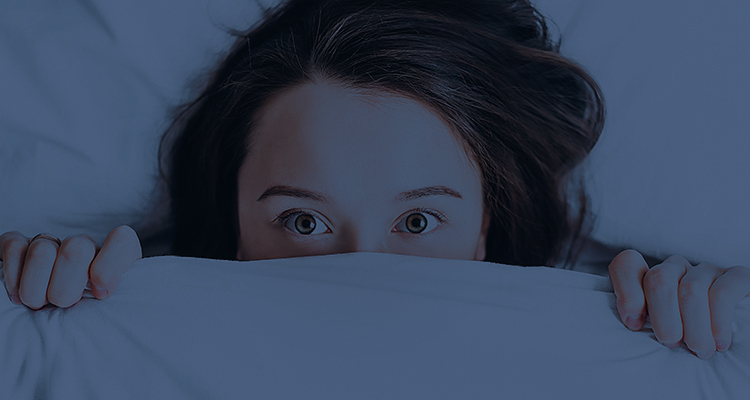
The good news is, Somnus Therapy offers a wide range of insomnia treatment options, activities, and resources to help you achieve the deep, restful sleep you’ve been dreaming of. From awareness and acceptance to cognitive restructuring, Somnus treats your sleep disorder from the inside out.
Click here now to start your journey toward blissful sleep.















